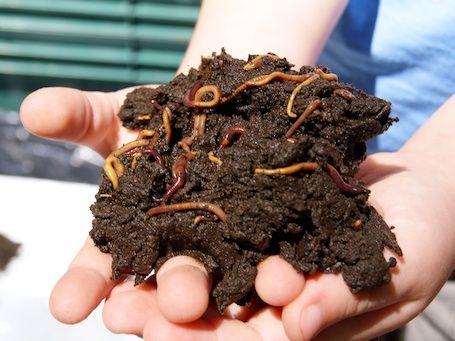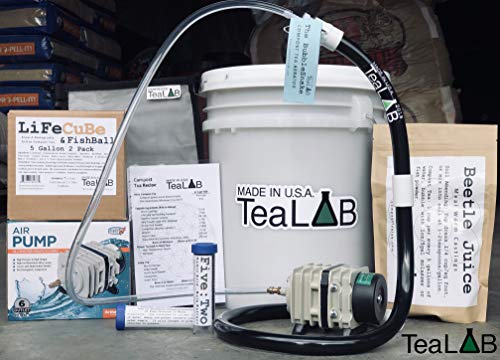Everyone knows that compost is a phenomenal addition to the soil which results in better growing gardens. But did you know that you can further benefit your plants by steeping them a pot of Compost Tea?
With the right equipment, Compost Tea is easy to make. Soaking your compost in water extracts beneficial microbes. The resulting nutrient-rich brew can be applied to the soil or sprayed directly onto plant leaves.
Compost Tea acts as both a plant fertilizer and as a disease prevention agent (including root rot disease). Using Compost Tea as a replacement for toxic fungicides, pesticides, and chemical-based fertilizers is a simple and logical way to protect the environment and garden safely.
Compost tea is an effective natural fertilizer for seedlings, gardens, and lawns that also suppress fungal plant diseases. Microbial activity distinguishes “soil” from just plain old dirt.
Table of Contents
Compost vs Compost Tea
Many people ask why not just put compost directly into the soil without the fatigue of brewing and straining tea? There are many reasons that compost tea can be preferred over simple compost. You can spray the compost tea on the leaves to suppress foliar diseases, increase nutrients available to the plant and expedite the breakdown of toxins.
The compost tea better serve the purpose to increase the microbe population in the soil
Compost Tea Benefits

- Over time, the microbial activity in the soil reaches very low levels due to pesticide and fungicide use or they have never been improved from their native state. The compost tea gives microbes a jumpstart to the soil of your yard, garden, or houseplants that eats organic matter and provide nutrients to plant roots.
- It is cyclical, natural, eco-friendly and zero waste: You can build much needed healthy soil by using the worm castings or tea made from ingredients that are going to the landfill. This is an effective way to return the food scrap or kitchen waste to soil and reshape it new edible food.
- Microbes and beneficial bacteria: the compost tea helps provide and retain beneficial microorganisms in the soil that compete with disease-causing organisms and enhance the retention of nutrients.
- Boosts Plants’ growth: The compost tea not only makes the good nutrients easily available to plants by breaking them down but also influence on plants stomata to improved uptake of nutrients. The compost tea even increase the nutritional quality and improve the flavor of vegetables.
- Plants get hardier and immune to pests: This will also reduce the needs of any toxic chemicals or fertilizer that can potentially run off into streams and impact on human. The application of tea to plants helps them to respond appropriately to any heat stress.
- Increased water retention ability of soil: the microbes help retain moisture in the soil. You will need 1/4 the water to quench the thirst of plants. Just imagine how much can you save in water bill by applying to your lawn.
So are you convinced enough to use it? Let check out how to use it.
Cons of Compost Tea
There are no significant disadvantages to using compost tea at all. The only con of compost tea can be the issue that does you even need compost tea?
You probably do not need compost if your soil has enough aerobic microbes. The best reason to use compost in healthy soil is to replace microbes. However, when the beneficial organisms are lost through overuse of pesticides and inorganic fertilizers, and not replaced or helped out through remediation techniques. All this trigger disease that becomes a serious and never-ending problem. The lack of competition for food resources, space, and infection sites on a plant leaf, blossom, and root surfaces means that disease-causing organisms will be out-of-control in most agricultural fields.
If you are overusing the compost tea, don’t let it runoff as it could conceivably contribute to water pollution.
Moreover, if you have not aerated the compost tea, it can create some problem that is discussed in details in the post Is Anaerobic Compost made without Pump Harmful?
Compost Tea Ingredients
The quality of compost tea depends on many factors the type of compost (fungal or bacterial), Temperature of compost, starting materials of the compost (e.g., green, woody, manure), tea recipe (bacterial or fungal), water source (chlorine degassed), aeration, and the highest Temp during brewing.
Before deciding on ingredients, you would also like to decide the purpose first.
- Do you want to use it as Soil Drench or Foliar?
- Do you want a fungal or bacterial tea?
The fungal dominant compost is usually used for trees. You brew hydra-hume in water for 24-48 hrs along with compost, kelp, fish hydrolysate, vegetable oil, and flour.
The bacterial dominant compost is usually used for lawns. You brew molasses in water for 18-24 hrs along with compost, kelp, fish hydrolysate, and vegetable oil.
The compost or castings is made with the help of Redworms (Eisenia fetida) that convert food waste and other organic material into the most useful soil amendment or small nutrients balls readily available to plant roots for uptake.
Check this complete kit that has everything for to brew your own compost tea.
How to make Tea?
You can make compost tea in your home by simply following this standard recipe. You can alter the amounts of additives relative to quantities of water.
- Aerate the water for 20-30 minutes before adding compost to eliminate the chlorine.
- Fill the bucket with water and set up your pump. Test your air pump by turning it on to see if it bubbles the water.
- Add 2 teaspoons of a fish hydrolysate in 25 gallons of water (Neutralize the acid preservative by pre-diluting according to the instructions on the container).
- You can also use 1-2 tablespoons of diluted humic acid instead of fish hydrolysate (preferably extracted from your own compost).
- Dilute half cup of kelp with 5 cups of water and add to the compost tea.
- Add molasses if you want your tea to be bacterial-dominant.
- Add 5 pounds of aerobic compost (should smell good).
- To improve fungi, you can add additional foods with the compost like 1 cup steel cut oats, bran flour, shrimp shells (no protein on the shells!) in the compost bag.
- Replace humic acids with an equal amount of fish hydrolysate if you want to provide nitrogen boost to the plants.
- After brewing, Strain the tea using any porous fabric (cheesecloth, old shirt, burlap) and add the left-over solids to the compost bin or garden.
- You can dilute the remaining liquid tea with water if you want. Use it immediately!.
Make sure to meet following standard conditions for the beneficial micro-organisms present in the compost to reproduce rapidly:
- The water at room temperature. The favorable range is 55-85 F, with an ideal temperature between 65-75 F.
- No chlorine (aerate it for 20 mins to de-gas)
- Neutral water (pH = 7)
- Maintain the oxygen in water above 6ppm through the entire brewing cycle. Use aerators and pump to make actively aerated compost tea.
- Don’t brew in direct sunlight as it promotes the growth of algae.
- Use a horizontally elevated container to maximize the exposure to air. Don’t use deep water barrel that will make most of the water column non-aerated.
- Use well-aged aerobic compost containing a substantial amount of active bacteria, total bacterial biomass, active fungal biomass, total fungal biomass, flagellates, ciliates, beneficial nematodes, and amoebae.
- You can proportionate the 1 pound compost with 5 gallons of water.
- The brewing time for fungal-dominant tea is 24-48 hrs and for the bacterial dominant compost is 18-24 hrs. Without aeration, give 3-4 days to the mixture to steep.
Following these instructions, you will get compost tea teemed with beneficial plant-growth nutrient and living microbes.
How to use Compost Tea?
With any prep work, you can just sprinkle it over your lawn and garden beds using a standard watering can. The water it to fully moisten the soil. However, we recommend the following directions to use compost tea for maximum benefit:
- Plan ahead and apply the tea on the same day that you have made or purchased. You would want to keep the microbes alive as the tea become less oxygenated over time.
- More is always better in the case of composting, as you will get faster and greater results. However, you can apply once per week for at least eight weeks as a routine.
- You can pour the tea directly into the soil or use with the type of sprayer that attaches to the end of your hose too.
- You can dilute the tea with water to cover a larger area like a lawn.
- Pour water immediately before or after to allow microbes to easily move down into the soil.
- If you want to use compost tea as a foliar (spray on the leaves), apply in the morning or early evening to minimize the harmful effects of UV rays on the microorganisms.
- Apply compost tea instead of water to container and houseplants once per week for good results.
- Apply direct or foliar spray the garden plants at critical vigorous growing stages such as in early summer, flowering, and fruit set.
- The best time to apply the compost tea to the lawn is when the grass begins to turn green in the spring. Also, apply once a month throughout the whole growing season for better results. You can spray using a pump sprayer or a hose-end sprayer.

